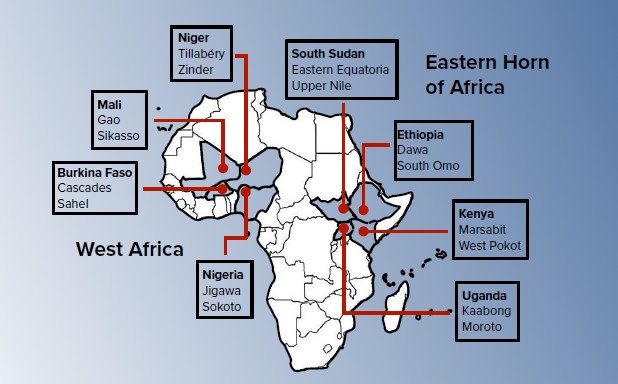--- Image caption ---
Lily Murei, PhD, UNDP Africa Borderlands Centre Policy Research and Data Specialist
As the year takes off, so does a groundbreaking new study on life in borderland areas. The UNDP Africa Borderlands Centre is partnering with two research organizations – WANEP in West Africa and INFOTRAK in the Eastern Horn – to examine how pastoralists and farmers in both regions cope with, survive, and build resilience against the multiple vulnerabilities they face as borderland dwellers. Our shared goal is to learn from the lived experiences of borderland inhabitants on how we can best support their development goals.
Borderland communities have long contended with a variety of challenges. The livelihoods of borderland farmers and pastoralists are subject to heightened levels of risk, exacerbated by a lack of access to basic services such as clean water, adequate health facilities, and electricity. They are especially vulnerable to climatic events such as drought, flash floods, and locust invasions. The scarcity of resources in these regions leads to frequent conflicts among borderland communities over water and grazing land.
These risks have led to the continual disruption of livelihoods and increased vulnerability in borderland regions. The exposure of farmers and pastoralists to adverse environmental, economic, and social conditions has generated a complex web of adverse competitiveness, leading to perennial conflict. Borderland farmers and pastoralists are vulnerable to recurrent shocks with cumulative effects, leaving residents at greater risk of poverty and stunted development, and depriving communities – and, indeed, the continent at large – of their full human potential.
All these conditions are known, having been documented by previous research. Less known is how borderland farmers and pastoralists, and the communities surrounding them, cope – how they navigate a difficult environment characterized by acute shocks and changing circumstances. What are their strategies, their successes, their sources of resilience? What are the nuances and dynamics of daily life in the borderlands, beyond the stories of conflict and deprivation by which they are so often characterized?
This is what we have set out to investigate, by centering on the voices of those who know best – inhabitants of borderland communities themselves.
The study is unprecedented in scale and scope: 1,000 borderland inhabitants are being surveyed across eight countries from two subregions, using a mixed-methods approach combining quantitative surveys and qualitative long-form interviews. Participants have the option to express themselves in their own languages, facilitated by research teams intimately familiar with the cultures and social mores of the participants’ communities. We also ensure that the respondent group is gender-balanced and reflects the ethnic diversity of each location, to enrich our analysis and yield more targeted development responses.
As of this writing, research teams are diligently at work in selected communities in Burkina Faso, Mali, Niger and Nigeria in West Africa, and in Ethiopia, Kenya, South Sudan and Uganda in the Eastern Horn. A full report of our findings will be released in mid-2022.

 Locations
Locations






